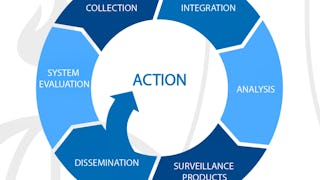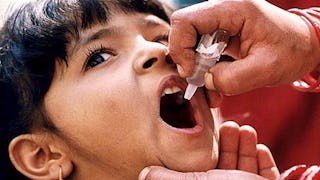In this course, we'll build on the previous lessons in this specialization to focus on some very specific skills related to public health surveillance. We'll learn how to get the most out of surveillance data analysis, focusing specifically on interpreting time trend data to detect temporal aberrations as well as person, place, and time in the context of surveillance data. We'll also explore strategies for the presentation of surveillance data and some of the complex legal elements that affect its use. We'll then turn our attention to surveillance of non-communicable chronic diseases and how the data can be used to support prevention efforts. Finally, we'll explore special surveillance systems, such as syndromic surveillance, antimicrobial resistance, and event-related surveillance. This course is designed for public health practitioners with a focus on those working on health surveillance in municipal, regional, state, provincial, or even national public health agencies. We really think that this course will help those with an interest in health surveillance to see which approaches are used in actual practice of public health.

Enjoy unlimited growth with a year of Coursera Plus for $199 (regularly $399). Save now.

Surveillance Systems: Analysis, Dissemination, and Special Systems
This course is part of Epidemiology in Public Health Practice Specialization

Instructor: Stefan Baral, MD, MPH, MBA, FRCPC
11,567 already enrolled
Included with
(385 reviews)
What you'll learn
Analyze and interpret epidemiologic surveillance data
Present surveillance data in compliance with legal reporting requirements
Apply epidmiologic surveillance principles to non-communicable chronic diseases
Differentiate among indicator-based, event-based, and event-related surveillance systems
Skills you'll gain
- Trend Analysis
- Data Analysis
- Public Health and Disease Prevention
- Biostatistics
- Chronic Diseases
- Risk Analysis
- Data Ethics
- Epidemiology
- Media and Communications
- Information Privacy
- Public Health
- Infectious Diseases
- Technical Communication
- Law, Regulation, and Compliance
- System Monitoring
- Health Informatics
- Data Collection
- Health Policy
Details to know

Add to your LinkedIn profile
4 assignments
See how employees at top companies are mastering in-demand skills

Build your subject-matter expertise
- Learn new concepts from industry experts
- Gain a foundational understanding of a subject or tool
- Develop job-relevant skills with hands-on projects
- Earn a shareable career certificate

There are 4 modules in this course
In this first module, we're going to focus on the analyses used in health surveillance. Specifically, we're going to talk about how to interpret time trend data that's harnessed as part of health surveillance programs and strategies used to detect temporal aberrations. We're also going to build on some of your earlier specialization lessons on descriptive epidemiology with a real focus on how it can be used in the analyses of person, place, and time in the context of surveillance data. I really want to highlight throughout the module how we often underutilize surveillance data to analyze complex issues, but I also want to talk about the some of the limitations that exist within the data sets.
What's included
9 videos1 reading1 assignment1 discussion prompt
In this module, we will explore strategies for the presentation of surveillance data and some of the complex legal elements that affect the use of health surveillance data. Now, surveillance data are fundamentally different from research data. In research studies, people provide explicit consent for how their data are going to be used. For surveillance data, the collection doesn't include explicit consent. As a result, there are very specific laws governing how the data can and should be used to drive public health programs. We'll also discuss communication strategies in health surveillance given how sensitive it can be to message health surveillance data, and the associated recommendations that come along with communicating these data.
What's included
7 videos1 assignment2 discussion prompts
So we're switching gears today from communicable diseases to noncommunicable diseases, or often called, chronic diseases. I'll present some of the frameworks and approaches that have been developed to guide chronic disease surveillance and then I'll focus on giving different examples of these, ranging from cancer to cardiovascular health systems. Taking you back to the surveillance cycle from Dr. Gurley's course, "Surveillance Systems: Building Blocks," I'll provide some context on how these chronic disease surveillance systems can really impact chronic disease prevention strategies if communicated effectively. And that brings us back to communication, where we will again focus on approaches to communicate these complex issues and then give an example of how to apply communication framework in the context of a chronic disease.
What's included
8 videos1 assignment1 discussion prompt
In this module, I will discuss some of the really interesting special surveillance systems. Although having standardized approaches for infectious diseases and non-communicable diseases is fundamentally important, there are also some health issues that do not fit nicely into these boxes, and it's here where these special surveillance systems can really play an important role. As you will see, having a framework or approach to the issue is still relevant, but the approaches are really tailored to the issue at hand. We will start by discussing syndromic surveillance systems, including when to use them and also how to design them. We'll then really evaluate the differences between indicator versus event-driven surveillance systems. We'll then move on to anti-microbial resistance surveillance systems and then talk in more detail about event-related surveillance systems.
What's included
9 videos1 assignment1 discussion prompt
Earn a career certificate
Add this credential to your LinkedIn profile, resume, or CV. Share it on social media and in your performance review.
Instructor

Offered by
Explore more from Public Health
 Status: Free Trial
Status: Free TrialJohns Hopkins University
 Status: Preview
Status: PreviewJohns Hopkins University
 Status: Preview
Status: PreviewJohns Hopkins University
 Status: Free Trial
Status: Free Trial
Why people choose Coursera for their career




Learner reviews
385 reviews
- 5 stars
81.29%
- 4 stars
14.80%
- 3 stars
2.59%
- 2 stars
0.25%
- 1 star
1.03%
Showing 3 of 385
Reviewed on Aug 21, 2020
Excellent course, lots of practical information useful for many situations in my experience. Thank you for this opportunity.
Reviewed on Sep 1, 2022
The concepts were discussed in a clear manner. Ijust realized how extensive is the scope of espidemiology. Much appreciation !
Reviewed on Jun 14, 2021
awesome lecture ,its really helpful specially medical field students.
Frequently asked questions
To access the course materials, assignments and to earn a Certificate, you will need to purchase the Certificate experience when you enroll in a course. You can try a Free Trial instead, or apply for Financial Aid. The course may offer 'Full Course, No Certificate' instead. This option lets you see all course materials, submit required assessments, and get a final grade. This also means that you will not be able to purchase a Certificate experience.
When you enroll in the course, you get access to all of the courses in the Specialization, and you earn a certificate when you complete the work. Your electronic Certificate will be added to your Accomplishments page - from there, you can print your Certificate or add it to your LinkedIn profile.
Yes. In select learning programs, you can apply for financial aid or a scholarship if you can’t afford the enrollment fee. If fin aid or scholarship is available for your learning program selection, you’ll find a link to apply on the description page.
More questions
Financial aid available,





